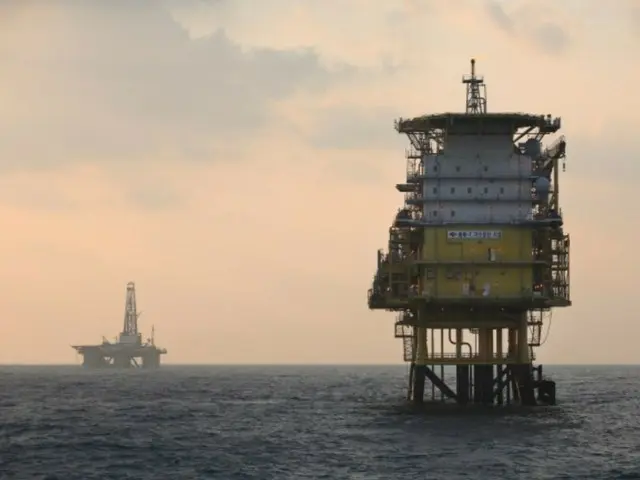"However, the scale of the exploration was not meaningful and economically viable," it said. At one point, it was reported that the total value of the resources lying beneath the ocean was five times the market capitalization of Samsung Electronics.
The project has been under the name of "Blue Whale Project," but the Korean media has said that the government's investigation results announced on the 6th are "effectively
The idea that there may be large reserves of oil and natural gas in the Sea of Japan off the coast of Pohang in the southeast was first suggested by Yoon in June last year.
President Yoon Seok-yeol announced this at a press conference. Yoon said at the time that he had asked a world-class deep sea technology evaluation specialist company to conduct a deep geophysical survey and analysis, and estimated the deposits to be "up to 14 billion
This amount is enough to cover South Korea's natural gas consumption for up to 29 years and its oil consumption for up to four years, and it sparked public interest at the time.
Like Japan, South Korea is a country with few natural resources, and has been exploring for offshore oil and gas fields since the 1960s.
The Park Chung-hee administration at the time began drilling the seabed off the coast of Yeongil Bay in Pohang City to meet its own oil supply and demand. In 1976, President Park announced that "oil has been discovered off the coast of Pohang for the first time.
The government announced that drilling had been completed in the Sea of Japan in 1990, and expectations were high, but the next year it was announced that drilling had been halted as it had become clear that it was not economically viable.
The discovery of a gas field of a size equivalent to 100,000 m2 in the past year, but commercial production ended in 2021. Following Yoon's announcement, media outlets reported that "the total value of the resources lying dormant on the ocean floor is five times the market capitalization of Samsung Electronics."
However, the reports were generally calm, with headlines such as "Is oil and gas development off the southeast coast of South Korea a hasty decision?" (Yonhap News Agency) and "It is too early to assess the economic viability" (South Korean newspaper Hankyoreh).
At the time, Yonhap News reported that the mining area, which had been announced as having a high probability of containing large-scale oil and gas deposits, had been deemed "without future" by Australia's major resource company Woodside Energy the previous year.
The Hankyoreh also reported this at the time, stating, "Woodside's 2023 annual report includes plans to explore the area off the coast of Canada, Peru, Myanmar, and other areas, including South Korea.
"The article states that they are withdrawing because 'it no longer has any future.' It can be interpreted that they are withdrawing because they have determined that the business is not viable." In response to these reports, the Ministry of Trade, Industry and Energy (Ministry is equivalent to a ministry)
At the time, Woodside said it had withdrawn from the business as part of a process to streamline its existing operations after merging with Australia's major resource company BHP in June 2022.
"The interpretation that the drilling was successful is contrary to the facts," he said. In addition, the main opposition Democratic Party of Korea said, "There is a high possibility of failure, and it is a waste of tax money," as the government had estimated the success rate of the drilling to be around 20%.
Among the seven "promising structures," meaning geological structures where oil and gas are expected to exist, drilling will begin at the candidate site with the highest probability of containing gas.
An investigation was carried out, but the Ministry of Trade, Industry and Energy determined that the "hydrocarbon gas saturation level," which is the key to determining the economic viability of the oil and gas reserves, was not at a level that would allow for commercial production.
On the other hand, since it was confirmed that the geological structure necessary for oil and natural gas deposits is good, the government plans to continue further investigations by attracting foreign capital, etc.
However, South Korean media reported that "the momentum to promote the investigation of the remaining six promising structures will weaken as the first investigation did not show a clear path to success."
"There are views that this is the case" (public broadcaster KBS), and "The project itself is expected to lose a major boost" (Hankyoreh).
Meanwhile, the Chosun Ilbo newspaper said in an editorial dated the 8th that "the results of this first drilling were somewhat predictable.
"It can be said that this is a good result," he said, but added, "It is too hasty to call the results a success or failure."
"If we were to call it fraud just based on the results of the first drilling, then almost all the oil fields in the world would be frauds," he said, citing examples such as the failure of the project and the failure of President Trump last year.
He took issue with the fact that even resource development was being used as a tool for political struggle, with Ryo himself publicly announcing the possibility of resource deposits.
2025/02/10 12:01 KST
Copyrights(C)wowkorea.jp 5

